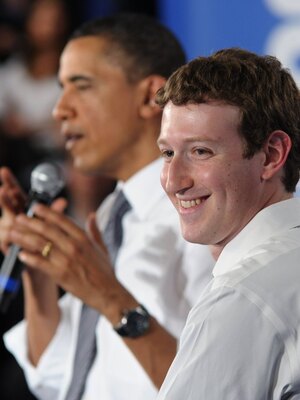Critics say the blossoming friendship between Zuckerberg and President Obama, shown together above, could ultimately hurt users of the social networking site. An Overly Chummy Relationship? During a town hall meeting at Facebook's Palo Alto headquarters, Obama introduced himself as the man who got founder and CEO Mark Zuckerberg to give up his trademark hooded sweatshirt for a jacket and tie. "The first time we had dinner together, and he wore this jacket and tie," said Obama, "halfway through the dinner he's starting to sweat a little bit, it's really uncomfortable for him, so I helped him out of his jacket." All this coziness makes some privacy activists uncomfortable. "The Obama administration holds the keys to Facebook's future," says Jeff Chester of the Center for Digital Democracy. "I think the president should have been much more cautious when he stood up there with Mark Zuckerberg." Facebook has more than 600 million members, about half of whom visit the site more than once a day to share photographs, describe their feelings or "like" a band. All that activity means the company owns a huge amount of information about a huge number of people. And the rules for what the company can do with that information are still being written. "Many members of Congress who will be weighing in on this issue are users of Facebook," says Rey Ramsey, the CEO of TechNet, a political network of executives at tech companies, including Facebook. If you don't like your power company or your water company, in the United States you likely have very few alternatives. The same is true with social networking in this country and globally; Facebook dominates. Ramsey says he believes politicians writing new Internet privacy rules can be impartial, even as those same politicians may depend on Facebook for fundraising and communications. After all, Ramsey says, the government regulates all kinds of industries that politicians use every day. "We use electricity, but we have an agency that oversees that." This concept of Facebook as a utility that people cannot live without in the modern world — like electricity, water or gas — is also gaining traction among Facebook's critics. "If you don't like your power company or your water company, in the United States you likely have very few alternatives," says Christine Rosen of the technology journal The New Atlantis. "The same is true with social networking in this country and globally; Facebook dominates." Rosen, who is also a scholar at the right-leaning American Enterprise Institute, believes people are now using Facebook "as if they're turning on a light switch or turning on their water, so I think it might be helpful to start thinking about some of the questions that raises about how the government should look at it." A Push For Stronger Privacy Rules Facebook, which declined to comment for this story, does not like people to call it a utility. After all, anyone can create a competing social network. And more to the point, utilities are heavily regulated. Already, the government is moving toward stronger privacy regulations online. The Obama administration released a privacy policy framework last year, and a bill in the Senatelooks similar to the administration proposal. "When it comes to privacy, the administration has a split within its personality," says Ohio State University Law professor Peter Swire. He was President Clinton's privacy adviser and served as a lawyer to the Obama social media team during the presidential transition two years ago. "The campaign was based on motivating people through social networks," he says. "On the other hand, the administration is supporting unprecedented privacy protections. Working that out is tough for society, and it's a split for the administration, as well." One administration official who works on these issues remarked that Facebook has disproportionately little contact with the White House compared with other big tech companies. But Facebook is trying to change that. The hires they announced this week are the first step to catching up with companies like Google and Microsoft in Washington. Ed Black, CEO of the Computer and Communications Industry Association, argues that these growing ties will have no impact whatsoever on the ultimate set of privacy rules. "Can you really imagine that Facebook's going to shut off one-third of the Congress who voted against them on something and not give them access? Do you realize how absolutely absurd that would be?" While politicians do have an interest in using Facebook, they also have an interest in privacy. Elected officials are at least as worried as the rest of the world about what personal details of their lives online could someday be revealed. |













0 comments:
Post a Comment